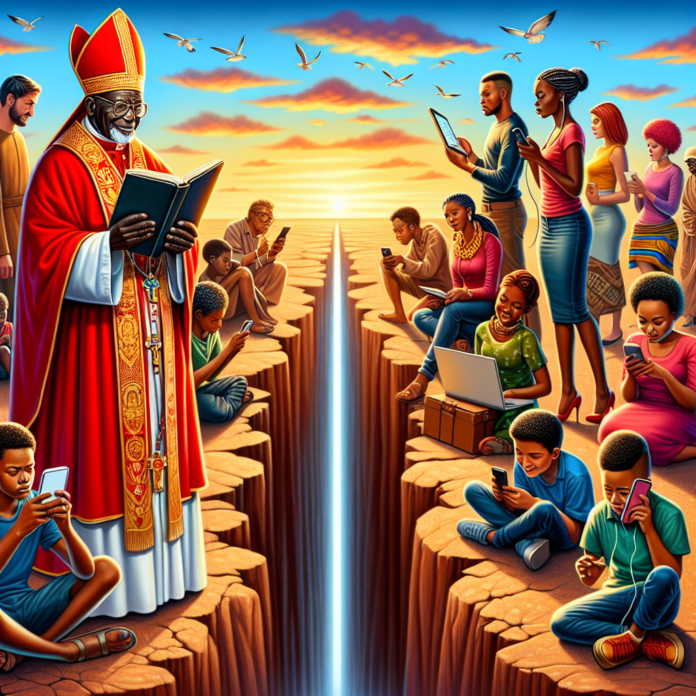Africa’s Cardinal Sarah and His Disconnect with Today’s Youth: A Divergence in Ideologies
In the modern landscape of the Catholic Church, where progressive values are increasingly gaining traction, a schism appears to be widening between traditionalist figures and the younger generation seeking guidance and representation. One such figure emblematic of this divide is Cardinal Robert Sarah of Guinea, a prominent conservative within the Church who upholds traditional practices and espouses views seemingly anachronistic to today’s youth.
The Rise of Cardinal Sarah
Cardinal Sarah, born in 1945, ascended through the ecclesiastical ranks, ultimately becoming Prefect of the Congregation for Divine Worship and the Discipline of the Sacraments. He has been a vocal advocate for the traditional Latin Mass and other conservative doctrines that he believes are fundamental to the essence of Catholicism. His writings, such as "God or Nothing" and "The Day is Now Far Spent," delve into his perception of a Church under siege by secularism and moral relativism.
However, these views, lauded by some, clash starkly with the aspirations and values of many young Catholics today. While traditionalism holds a place in Catholic history, it is worth questioning whether clinging to these ancient practices serves the spiritual needs of a generation navigating an increasingly complex and pluralistic world.
The Youth’s Call for Progress
The disconnect becomes particularly evident when considering the values and priorities of today’s youth. Young Catholics are more likely to be concerned with social justice issues, inclusivity, and the Church’s role in addressing contemporary societal challenges, rather than the rigorous adherence to rituals of the past. In contrast, Cardinal Sarah’s advocacy for the traditional Latin Mass, a form of liturgy that predates the Second Vatican Council, seems to many a retreat into a nostalgic past that does little to address present-day concerns.
The Second Vatican Council, which took place between 1962 and 1965, was a pivotal moment in the Church’s history, ushering in significant reforms aimed at modernizing the Church and making it more accessible. The Council’s outcomes encouraged the use of vernacular languages in Mass, promoted ecumenism, and engaged more directly with pressing social issues. These progressive steps were instrumental in revitalizing the Church’s relevance at the time, yet figures like Cardinal Sarah appear intent on reversing these gains, favoring the perceived purity of pre-Vatican II traditions.
Pope Francis: A Progressive Beacon
In contrast to Cardinal Sarah’s conservatism, Pope Francis embodies the progressive values that resonate with many of today’s young Catholics. Since his election in 2013, Pope Francis has emphasized mercy, humility, and inclusivity. His focus on addressing climate change, advocating for the marginalized, and his more open stance towards the LGBTQ+ community has found favor among younger demographics who look to the Church for moral leadership in navigating contemporary ethical dilemmas.
The Pope’s encyclical "Laudato Si’," which calls for urgent action to protect our "common home," resonates deeply with a generation particularly attuned to environmental issues. Likewise, his apostolic exhortation "Amoris Laetitia," which, among other things, advocates for a more compassionate approach to divorced and remarried Catholics, signals a shift towards a more empathetic and understanding Church.
The Latin Mass: A Symbol of Division
The traditional Latin Mass, championed by Cardinal Sarah, has become a touchstone issue symbolizing broader ideological rifts within the Church. For many young Catholics, the Latin Mass represents a form of exclusivity and rigidity incompatible with their vision of a welcoming and progressive Church. Conversely, proponents argue that it preserves the sacredness and mystery of the liturgy, offering a sense of continuity with the historical Church.
Nevertheless, it is evident that the majority of young people find greater spiritual nourishment in liturgies that are comprehensible and interactive. This preference reflects a broader desire for a Church that evolves in tandem with the congregants it serves, rather than one fixated on the immutable past.
The Path Forward
The juxtaposition of Cardinal Sarah’s traditionalism with the progressive values championed by Pope Francis delineates an ongoing struggle about the direction of the Catholic Church. The divergence highlights a profound generational divide that threatens to alienate many young Catholics if the Church does not find a way to harmonize its rich traditions with the pressing demands of contemporary life.
For the Church to remain relevant to its younger followers, it must prioritize inclusivity, social justice, and the use of vernacular language in liturgical settings. While tradition has its place, it should not stifle innovation or impede efforts to address the real-world challenges that preoccupy today’s youth.
In conclusion, the future of the Catholic Church hinges on its ability to bridge the chasm between the past and the present, blending the wisdom of tradition with the dynamism of progress. Progressive values, as embodied by Pope Francis, offer a path towards a more inclusive and empathetic Church, one in which all members, particularly the youth, can see their values reflected and their voices heard.
